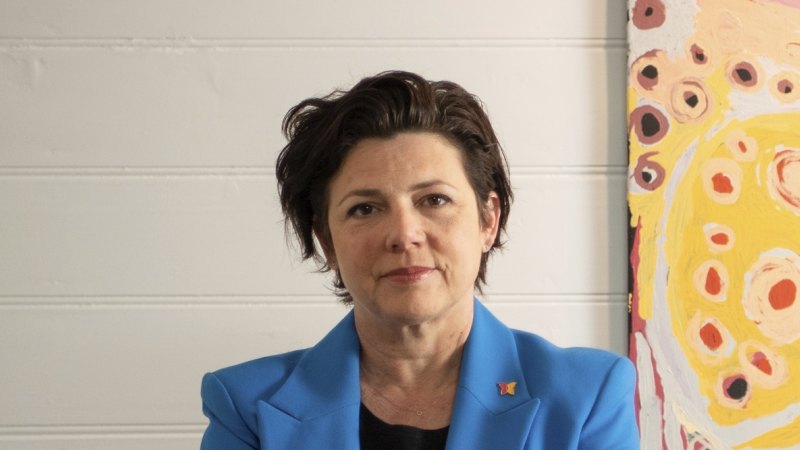Save articles for later
Add articles to your saved list and come back to them any time.
One of Australia’s most prominent mental health charities, Beyond Blue, is facing a restructure and job losses as donations plummet by almost $18 million in two years.
The not-for-profit organisation is feeling the pinch of a trend being reflected nationally, which has seen general donations, including philanthropic contributions, tumble during the pandemic.
Beyond Blue chief executive Georgie Harman.Credit: Penny Stephens
Beyond Blue said its philanthropic income had declined by about a third in the most recent financial year, hovering at $17.8 million, a drop from $26.9 million in the previous financial year, amid soaring demand for mental health services off the back of coronavirus lockdowns.
Annual reports for the charity, which was founded by former Victorian premier Jeff Kennett in 2000, show that in the 2020/2021 financial year, Beyond Blue’s philanthropic income hit a record-breaking $35.7 million, made up of a combination of bequests, community fundraising and general donations.
However, Beyond Blue’s chief executive Georgie Harman said the organisation had been grappling with a significant drop in fundraising and philanthropic revenue since January last year.
“This is concerning because more than 300,000 people turn to the Beyond Blue support service every year,” she said.
“We anticipate many more will need us in the years ahead due to the many collective stresses we’re experiencing, from the pandemic to cost of living pressures to climate change and extreme weather events.”
Harman confirmed the organisation was changing its operational structure to ensure it continued to improve and increase its free mental health support and services.
One Beyond Blue staff member, who was not authorised to speak publicly, suggested to The Sunday Age that dozens of jobs could be under threat across the organisation.
However, the number of job losses has not been confirmed by Beyond Blue. It is understood the organisation is still finalising its restructure.
Beyond Blue said its focus remained on redeploying staff internally. The organisation stressed that there will be no reductions or changes to its front-line support services, including its 24-hour helpline, which was staffed by mental health professionals.
“There will be staff movement at all levels, including among executives and senior management, and we are redeploying people internally where possible,” Harman said.
The most recent data contained in Beyond Blue’s annual reports showed staffing levels grew from 244 in 2020/2021 to almost 300 staff the following year as its philanthropic income fell by almost $9 million in a year.
Harman said many not-for-profits were operating in a fiscally challenging environment, not just Beyond Blue.
She said the phone line service was not funded by governments and relied entirely on donations to operate.
“Philanthropic support for Beyond Blue makes a direct, immediate difference to someone’s life and every dollar counts,” she said.
Record numbers of Australians are turning to charities as the cost of living rises, but the increased demand for services is not being met with more funding or resources.
It was revealed in May this year, the nation’s charitable donations were lagging behind comparable countries.
As donations plummet to levels not seen since the 1970s, the federal government has made an ambitious promise to double its philanthropy by 2030.
It has also asked the productivity commission to review Australian philanthropy, with the aim of finding new ways to increase giving.
Philanthropy Australia’s chief executive Jack Heath said donations had taken a hit during the economic uncertainty of the pandemic, but the nation was slowly getting back to where it had been pre-COVID.
“Overall dollars are increasing,” Heath said. “But we are getting those dollars are coming from a smaller number of people.”
Philanthropy Australia has been pushing for a national giving campaign, as well as reforms, including making it easier for people to direct part of their superannuation to a charity after their death.
Harman said Beyond Blue was working to attract new corporate partners and philanthropic donors, and had plans to grow its events-based fundraising, including its signature Big Blue Table event, which happens every year in October.
“Revenue is declining while inflation bites, costs rise and service demand increases,” Harman said.
“Fundraising, corporate, and philanthropic giving has never been more important.”
If you are troubled by this report or experiencing a personal crisis, you can call Lifeline on 131 114 or Beyond Blue on 1300 224 636. To donate to Beyond Blue visit here
The Morning Edition newsletter is our guide to the day’s most important and interesting stories, analysis and insights. Sign up here.
Most Viewed in National
From our partners
Source: Read Full Article




